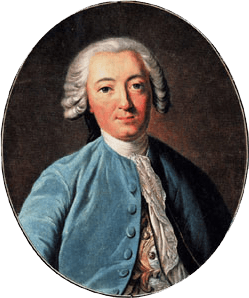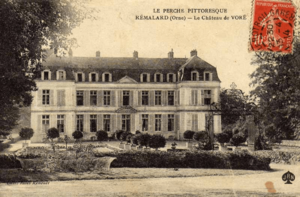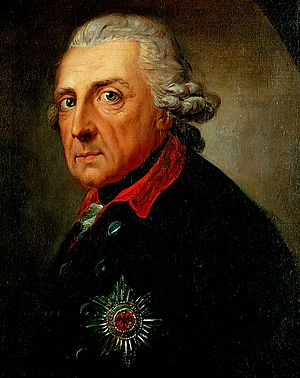Claude Adrien Helvétius facts for kids
Quick facts for kids
Claude Adrien Helvétius
|
|
|---|---|
 |
|
| Born | 26 January 1715 |
| Died | 26 December 1771 (aged 56) Paris, France
|
| Era | 18th-century philosophy |
| Region | Western philosophy |
| School | Utilitarianism French materialism |
|
Main interests
|
Ethics · Political philosophy |
Claude Adrien Helvétius (born January 26, 1715 – died December 26, 1771) was an important French philosopher, freemason, and writer. He lived during the Age of Enlightenment, a time when new ideas about reason and human nature were very popular.
Life of Claude Adrien Helvétius
Claude Adrien Helvétius was born in Paris, France. His family had a long history of being doctors. His great-grandfather was a Dutch doctor and alchemist. His grandfather helped introduce a medicine called ipecacuanha. His father was even the personal doctor to the Queen of France, Marie Leszczyńska.
Helvétius was trained to work in finance. He worked for his uncle in Caen, but he loved writing poetry in his free time. When he was 23, the Queen helped him get a job as a "farmer-general." This meant he collected taxes for the government, which was a very well-paid job. He earned a lot of money, about 100,000 crowns a year!
With his wealth, Helvétius enjoyed life. He loved art and literature. He also attended a progressive group called the Club de l'Entresol. As he got older, he wanted to achieve more lasting fame. He was inspired by famous people like Voltaire (a poet) and Montesquieu (a philosopher). His wife, Anne-Catherine de Ligniville, Madame Helvétius, ran a famous meeting place called a "salon." Many important thinkers of the Enlightenment met there for over 50 years.
His Famous Book and Its Impact
In 1758, Helvétius published his most important philosophical book, called De l'esprit (which means On Mind). In this book, he suggested that all human abilities come from our physical senses. He also argued that people are mainly motivated by their own self-interest. He believed that there isn't really "good" or "evil," only different kinds of pleasures.
These ideas caused a big stir! Many people were upset because his ideas seemed to challenge traditional beliefs. The Sorbonne, a famous university, even publicly burned his book in 1759. Because of this, Helvétius had to take back some of his statements.

Later Life and Charitable Work
In 1764, Helvétius traveled to England. The next year, he visited Berlin at the invitation of King Frederick II of Prussia, who showed him great respect.
After 10 years, Helvétius felt he had enough money. He quit his tax-collecting job and moved to a country estate in France. There, he used his wealth to help poor people. He also supported farming and new industries. Many philosophers admired him for his generosity.
Helvétius and his family lived part of the time at their country home, Château de Voré, and part of the time in their house in Paris. He was a Deist, meaning he believed in a God who created the universe but doesn't interfere with it. He died in Paris on December 26, 1771. After his death, another important work he wrote, De l'homme, de ses facultés intellectuelles et de son éducation (On Man), was published in 1773.

Helvétius's Philosophy
Helvétius's ideas were very influential during his time. He believed that human behavior could be understood and even improved.
What Motivates People?
Helvétius thought that everything humans do, like remembering or judging, comes from our physical senses. He believed that the main things that make people act are the desire for pleasure and the fear of pain. He said these two things "are, and always will be, the only principles of action in man." Even when someone makes a sacrifice, he believed it's because the pleasure of helping outweighs any pain.
Everyone Can Learn Equally
One of Helvétius's most important ideas was that "all men have an equal disposition for understanding." He believed that when people are born, their minds are like a "blank slate." This means they don't have any ideas or special talents built-in from birth. He thought that any differences we see in people's abilities come from their desire to learn, not from how they were born.
Because of this, he believed that we owe everything to education. He also thought that people from different nations are naturally equal. Any differences between countries come from their education systems and governments, not from the people themselves.
The Power of Education
Since Helvétius believed everyone has the same natural potential, he argued that everyone has the same ability to learn. This meant that education could be a powerful tool to improve society. He thought there were almost no limits to how much society could get better through the right kind of education.
He believed that if people in a country like London seemed smarter than those in France, it was because in London, "every citizen has a share in the management of affairs in general." This suggests that when people are involved in their government, they become more knowledgeable. He concluded that "the art of forming men... is strictly connected to the form of the government." This means that governments can use education to improve their citizens and society.
His main idea was that public rules for behavior (ethics) should be based on what brings the most good to the most people. He strongly emphasized how important culture and education are for a country's growth.
Who Did He Influence?
Helvétius's ideas about everyone having equal intelligence and the power of education were very important. They influenced later thinkers like John Stuart Mill. Cesare Beccaria, who worked to change laws about punishment, said Helvétius greatly inspired him. Helvétius also influenced Jeremy Bentham, another important thinker who developed the idea of utilitarianism.
His ideas about how society works also influenced Karl Marx, who developed the theories of communism. Marx studied Helvétius's ideas and called them "the social basis of communism."
Criticism of His Ideas
Not everyone agreed with Helvétius. The German philosopher Johann Georg Hamann strongly disagreed with his ideas that were based purely on reason. Some later philosophers, like Isaiah Berlin, even saw Helvétius as one of the "enemies of freedom" because his ideas could be used to support strong, controlling governments.
Poetry
Helvétius also wrote poetry. One of his poems, called Le Bonheur (Happiness), was published after he died. In this poem, he shared his idea that true happiness comes from making sure that what's good for one person is also good for everyone.
Images for kids
See also
 In Spanish: Claude-Adrien Helvétius para niños
In Spanish: Claude-Adrien Helvétius para niños
 | Toni Morrison |
 | Barack Obama |
 | Martin Luther King Jr. |
 | Ralph Bunche |




